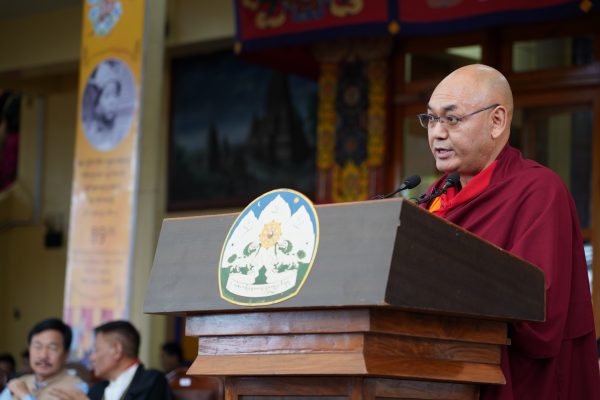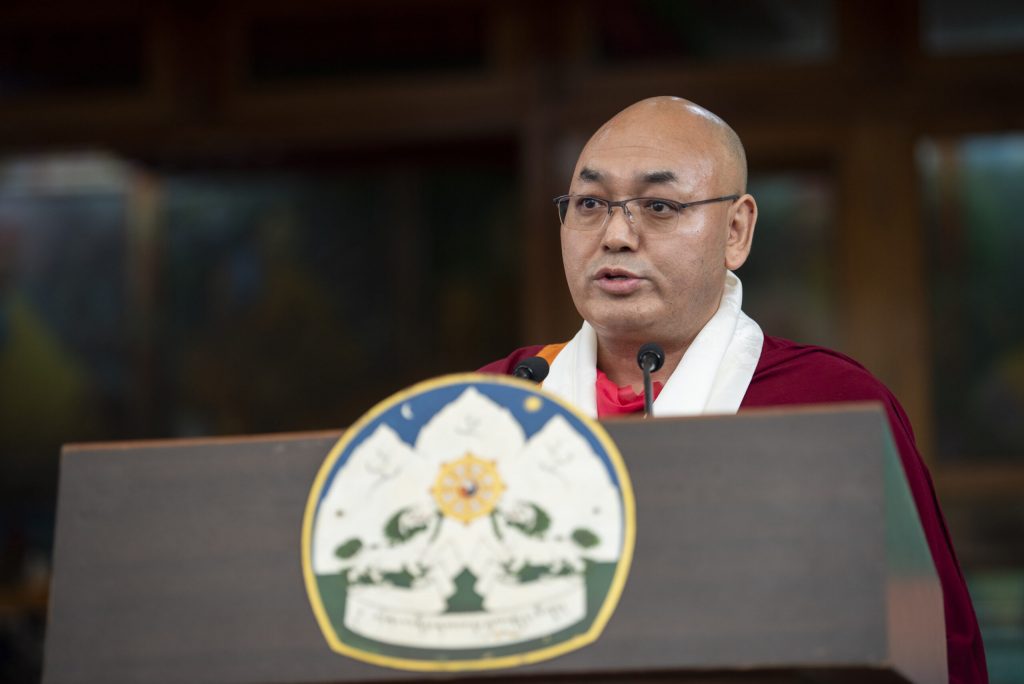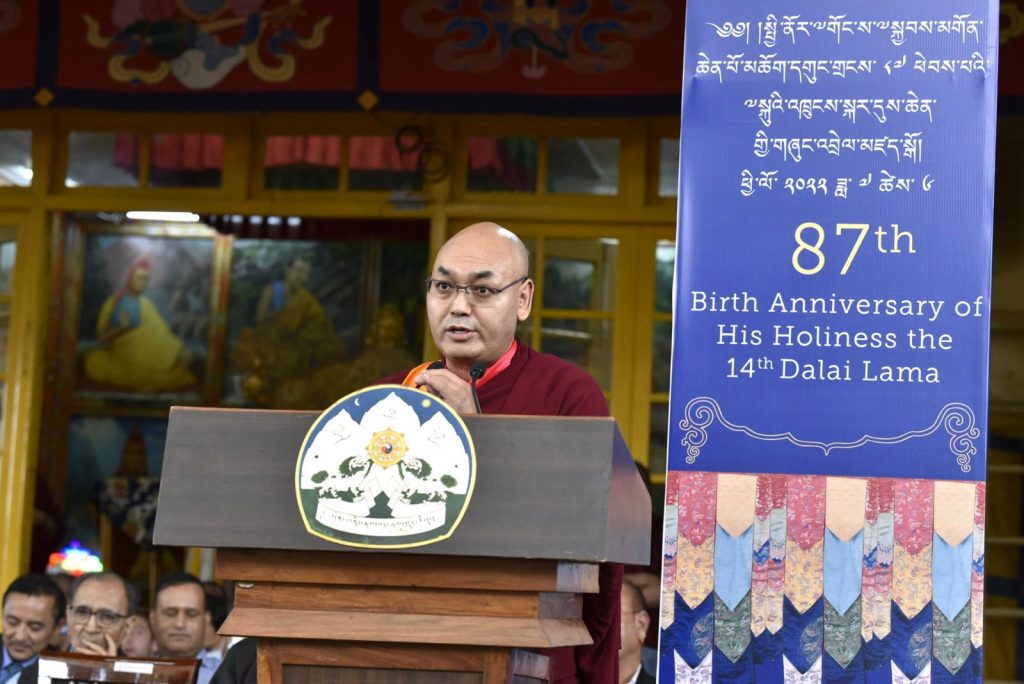Let me preface the special occasion today with offering of obeisance to His Holiness the Great Fourteenth Dalai Lama, the supreme saviour of all sentient beings, including the gods in the heavenly realms; the master of all teachings of the Buddha on this earth; a great champion of peace in this world; the human manifestation on this globe of Chenresig, the obligated deity of Tibet and the spiritual sovereign of The Three Realms of existence; and the saviour and supreme leader of Tibet and the Tibetan people. And let me then, on behalf of the Tibetan Parliament in Exile, offer my greetings and good wishes to His Holiness with a sense which at once combines feelings of joy, faith, and optimism.
Prevailed upon by a feeling of affection and closeness towards all sentient beings in general and especially towards the spiritual subjects of the Snowland of Tibet lying exposed in a state of vulnerableness, His Holiness the Dalai Lama took a deliberate decision to enter the realm of the samsara and so on the 5th day of the 5th month in the Wood-Hog Year of the 16th Tibetan Royal Sexantry, which corresponded to the 6th of July 1935, took birth at Tagtser Village in Domey Kumbum as a son to father Choekyong Tsering and Mother Dekyi Tsering. The birth was accompanied by the appearances of numerous and wondrous positive harbingers. And on this occasion today, which marks His Holiness the Dalai Lama attaining 82 years of age in accordance with the universal calendar, I offer my greetings to him, holding over my head the dust of his feet in a show of resolute body, speech and mind faith. The gratitude we owe to His Holiness the Dalai Lama for having thus far not assumed even a semblance of a miniscule amount of adverse impairment to his underlying bodily, speech and mind wellbeing and for the fact that he has been unwavering in consistently maintaining them in the prime of their state of purposiveness, is such that even a fraction of it could never be repaid even if we were to seek to do it by trying to make offerings of the wealth of the Three Thousand World Realms across a period of many great aeons.
All Tibetans living in countries across the world mark today as the birthday of His Holiness the Dalai Lama with feelings of joy, faith, and optimism. By it they memorialize the gratitude they owe to His Holiness for his deeds which have universal values and benefits. It is also a day for them to reaffirm their solemn pledge to make part of their daily practice His Holiness’s counsel and guidance on the do’s and don’ts of proper conduct in life to the best possible extent of their capacity. This then is the underlying purpose of marking the birthday of His Holiness the Dalai Lama.
Successive rincarnations of His Holiness the Dalai Lama have continued to assume the temporal and spiritual Leadership of Tibet ever since the time of the Great Fifth. And throughout that period the Tibetan people have flourished in the spheres of both religious and political governance. In particular, His Holiness the Great 14th Dalai Lama did, for the wellbeing of the people of Tibet, make a vigorous effort to reform the political system in order to improve the governance of the country. Unfortunately the communist Chinese government overran and took full control of the whole of Tibet in 1959. As a result, His Holiness the Dalai Lama was left with no choice but to escape to India and seek refuge in it along with nearly a hundred thousand Tibetans who also fled their homeland. Immediately on arriving in India, His Holiness set out to establish Tibetan schools, monastic institutions, and, likewise, settlements and so on. In particular, in keeping with his resolve to set the Tibetan government on course towards a democratic system, he, in 1960, established a system of democratic election for a Tibetan parliament in exile. Through this and other subsequent measures introduced over a period of time, His Holiness the Dalai Lama gradually led the Tibetan people on the path towards a democratic system of governance. It was thus that in 2001, the Kalon Tripa, the head of the Central Tibetan Administration, was directly elected by the Tibetan people. Later on, in 2011, His Holiness devolved his entire historical political and governance powers to the leadership in exile directly elected by the Tibetan people. He took these benevolent steps and other measures in such timely manner that they left no room for any possible suggestion that he had acted late or beyond the requirement of the given circumstances. To sum up, His Holiness the Dalai Lama continues, to this day, to be fully committed, day and night, across all periods of time, to be fully immersed in carrying out admirable deeds for the sake of both the immediate and long term wellbeing of Tibet and the Tibetan people. For all that I take the opportunity today on behalf of all Tibetans both in Tibet and in exile to express immeasurable amounts of gratitude to His Holiness the Dalai Lama.
Likewise, for his continuing kindhearted body, speech and mind deeds for the benefit of all sentient beings on this earth, for the sake of preserving the environmental health of this world, and for the purpose of ensuring the realization of a compassionate world, he is universally revered as a great champion of world peace. These have seen him being honoured with a total of more than 150 awards thus far, conferred by numerous groups and organization which belonged to both governmental and non-governmental sectors, including the most exalted award of them all – the Noble Peace Prize.
In January 2017, after he concluded his Kalachakra teachings at the most sacred Buddhist site of Bodh Gaya, the occasion being the ceremony for the long-life offering made by the Central Tibetan Administration, His Holiness the Dalai Lama very graciously reiterated his resolve to live to be more than one hundred years old. This is a gesture of especially great cause for gratitude to us Tibetan people. Likewise, after undergoing his annual medical checkup recently at the Mayo Clinic in the US state of Minnesota, His Holiness the Dalai Lama revealed that he had no trace of ailment on any vital organ of his body and that he was in great health. This came to the Tibetan people both in Tibet and in exile as a source of great reassurance, and it calmed any sense of anxiety that any among them might otherwise have had. It is extremely important, however, that all of us of the Land of Snows should, on our part, fully devote ourselves to virtuous, merit-accumulating deeds. And we should especially be mindful that all Tibetans – whether they be laypeople or belonging to any religiously ordained order – fully commit to heart all of His Holiness the Dalai Lama’s instructions and carry them out in a real sense in our day-to-day conduct.
It is with great admiration that we view the continuing fortitude and sense of nationhood of the Tibetan people in Tibet and their paying of close attention to and vigorous nurturing of the Tibetan language and culture. Likewise, we are encouraged by the sense of fraternity and unity with which Tibetans living in exile pay increasing attention to the Tibetan people’s struggle in general and especially to Tibet’s religion, language, and culture. And of course it is an important bounden duty of all of us to continue to perpetuate and build upon the unique ethically upright personal character that in general defines a Tibetan person. We therefore urge every concerned person, both those within the Central Tibetan Administration and the general Tibetan populace, to continue to carry it all on with even greater sense of responsibility.
It is a matter of concern that even today there is no indication of any positive change in the policy of the government of China towards the issue of Tibet. In fact, its controls and restrictions on the movement of the Tibetan people in every part of Tibet have been increasing. Besides it is implementing in Tibet a policy of colonialism. This means that even over minor matters, Tibetans are being subjected to limitless beating by the Chinese police. The Tibetan people are being looked down on and bullied by the Chinese. The instances of situations in which Tibetans receive such gross ill-treatment do not bear enumerating. This shows that China does not implement in Tibet a policy of equality of nationalities and rule by law as claimed by it. Rather, it makes manifest the government of China’s policy of discrimination against the Tibetan people. Given this situation, we insist that it is imperative that China implement in Tibet a policy of equality of nationalities. It is due to the absence of freedom and happiness in any sphere of life under the brutal policy of the government of China that from the year 2009 till the 18th of May this year there have been cases in which a total of some 149 Tibetans – including men and women, whether laypeople or monks and nuns – carried out peaceful protests by means of self-immolation. With shouting of calls such as “Let His Holiness the Dalai Lama be invited back to Tibet! Let there be freedom in Tibet!” and so on, these Tibetan people sacrificed their very life. It is impossible that the sacrifice these Tibetan people have made of their life could ever be forgotten. And it is important that the Tibetan people both in Tibet and in exile persevere more than ever before with the aim to realize the aspirations voiced by those Tibetans.
Recently, as a part of its international initiative towards what it called the pursuit of a common global economic development, the government of China organized in capital Beijing a major two-day meeting called Belt and Road Forum for International Cooperation beginning May 14, 2017. Prominent public figures from many countries took part in that forum. And it was suggested that the One Belt One Road (OBOR) initiative would be implemented in a total of 65 countries. It was also explained that through the projects under the OBOR initiative, opportunities would be created to benefit some 60 percent of the global population on account of the Chinese government-backed funding for the building of large numbers of new projects such as railroads, highways, ports, and industrial parks. It was further explained that under the OBOR initiative, plans were underway for the trade routes in the Southeast Asian countries to be routed through Tibet with building of new railroads and so on. It is beyond doubt that such kinds of projects will lead to catastrophic damage to the natural environment of Tibet. Given this grim reality, we urge the international community to raise objections and exert pressure on China against the implementation of these kinds of risky projects.
In May this year, a high level, bipartisan delegation led by former House Speaker and Democratic Party Leader Ms. Nancy Pelosi from the US Congress especially visited Dharamshala and met with His Holiness the Dalai Lama. The delegation also met with members of the Tibetan Parliament in Exile and the Kashag, and attended a special gathering of the Tibetan public. Such show of utterly selfless and unwavering support for the issue of Tibet sent a clear signal to the government of China that the Tibetan people are not alone in their struggle for the settlement of the Tibet issue. The delegation’s visit also had the effect of rejuvenating the Tibetan people’s struggle, gave hope to it, and also, tellingly, buoyed the spirit of the Tibetan people in Tibet whose hopes and fortitude were thereby enhanced. We take this opportunity to once again express our gratitude to that high level US congressional delegation.
Recently, the European Union and the government of China held their 35th bilateral human rights dialogue. During that dialogue, the members of the European Union delegation made it clear to their Chinese counterparts that they were strongly concerned about the serious violations of the fundamental human rights and other freedoms of the Tibetan people. They also called on the government of China to make efforts to resume its dialogue with representatives of His Holiness the Dalai Lama. In this connection the Subcommittee on Human Rights of the European Parliament also issued a press statement.
It will not be long before the 19th Plenary Congress of the Communist Party of China will be held in Beijing. The international community remains hopeful that the Congress’s review of the political situation facing the government of China in general and especially the political issues concerned with Tibet and the outcome of those reviews will lead to changes in a positive direction.
The mutually beneficial Middle Way Policy enunciated by His Holiness the Dalai Lama for achieving a peaceful negotiated solution is based on a realistic appraisal of the actual situation concerning the Sino-Tibetan dispute. This approach is designed to be capable of fulfilling the basis aspiration of the Tibetan people and at the same time to be beneficial to China too as it will help to preserve without any harm the integrity and harmony of the country. This being the indisputable case, we reiterate our call on the leaders of the government of China to set aside their hardline posture, grab the momentous opportunity offered by this proposal, and make greater efforts to resume the dialogue so that talks between representatives of His Holiness the Dalai Lama and the government of China may take place again.
Some days ago, members of the US Congress, members of the European Parliament and a number of other prominent public figures took part in grand celebrations on different dates to mark the anniversary of His Holiness the Dalai Lama’s birth and in other related events. We take the opportunity offered by this occasion to offer to all of them and those who organized them our praise and gratitude.
It has now been 58 years since the Tibetan people first arrived in exile and later spread out to live as refugees in India and numerous other foreign countries. It is especially heartening that both the people and government of India have extended to the Tibetan people extensive help and friendly support. With a sense of having a remembrance of gratitude for all these gestures at all times, we also take this opportunity to once again express our immense gratitude to both the people and government of India. Likewise, we also take the opportunity offered by this particularly auspicious day to express our thanks to the people in governments and non-governmental sectors in the international community who have extended help and cooperation to the Tibetan people and the Tibetan cause.
Finally to conclude this speech, we offer prayers that His Holiness the Dalai Lama may continue to live for a hundred aeons, that all his wishes may be seen fulfilled with spontaneity, and that the just cause of the Tibetan people may be seen accomplished in all speediness.
By the Tibetan Parliament-in-Exile
6 July 2017
. . . . . . . . . . . . . . . . . . . . . . . . . . . . . . . . . . . . . . . . . . . . . . . . . . . . . . . . . . . . . . . . . . . . . . . . . . . . . . . . . . . .
* In case of any discrepancy between this English translation and its Tibetan original, the latter should be treated as authoritative.




